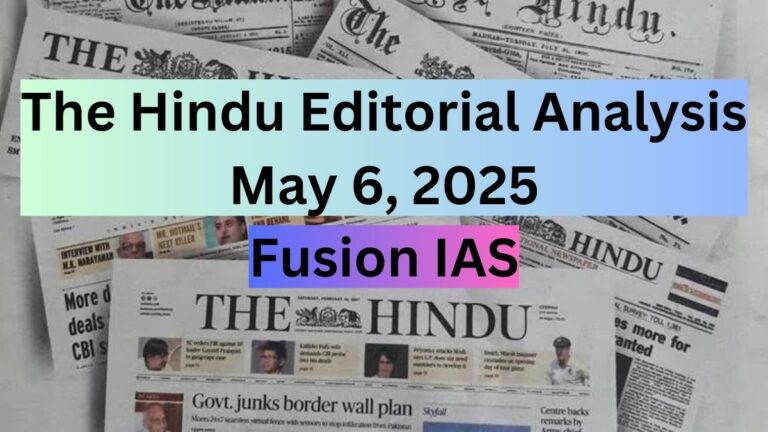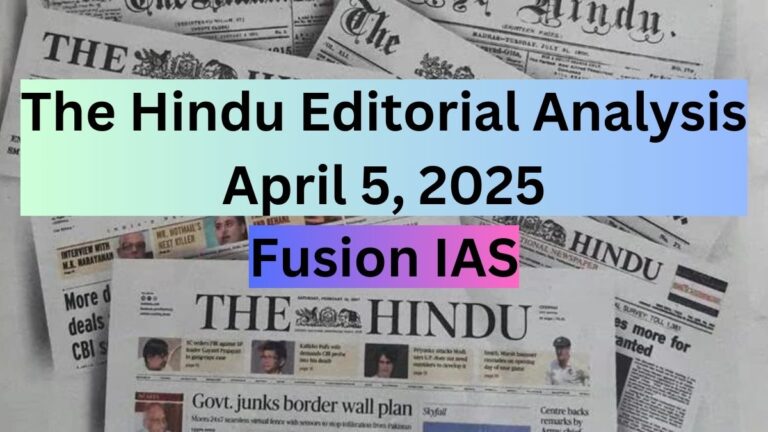
The Indian Express Editorial Discussion is a crucial resource for UPSC CSE aspirants, providing in-depth analysis of current affairs, governance, economy, and international relations. It helps candidates develop a nuanced understanding of key issues with factual accuracy and multiple perspectives. Regular engagement with these discussions enhances analytical skills, aiding in answer writing for Mains and interview preparation.
With stand on Chagos Islands, India sends a message to neo-imperialist powers
India’s support for Mauritius’ claim over the Chagos Islands underscores its commitment to decolonization, sovereignty, and territorial integrity. This move sends a strong message to global powers, particularly the US, UK, China, and Russia, regarding the need to uphold international laws against territorial expansionism.
India’s Position on Chagos
India has reaffirmed its long-standing anti-imperialist stance by supporting Mauritius’ sovereignty over the Chagos Islands. Foreign Secretary Vikram Misri recently stated India’s unequivocal support for Mauritius, aligning with India’s historical opposition to colonialism.
The Chagos Islands, home to the US military base at Diego Garcia, have been a contentious issue. While the UK agreed to transfer sovereignty to Mauritius, US policymakers have expressed concerns over the base’s future. A Republican senator even warned Britain against jeopardizing its strategic partnership with the US over this decision.
Neo-Imperialism and Global Power Politics
The Chagos dispute reflects broader neo-imperialist tendencies, where powerful nations continue to exert control over smaller nations’ territories. Historically, the US, China, and Russia have expanded through territorial conquests, while European colonialism shaped modern geopolitical boundaries. India’s anti-colonial struggle set an example for nations seeking independence in the 20th century.
The UN Charter explicitly prohibits territorial expansion through force. India invoked this principle when responding to the Russian invasion of Ukraine and has consistently questioned expansionist policies. By supporting Mauritius, India strengthens its role as a champion of anti-imperialism.
Need for a Global Anti-Imperialism Coalition
Post-colonial nations, including India, ASEAN members, Brazil, and African nations, should unite against neo-imperialism. A global convention must be convened to hold major powers accountable. The struggle against imperialism should not be diluted in the 21st century, especially with renewed claims over strategic territories like Chagos.
Strategic Implications and the Commonwealth’s Role
The UK’s decision to return Chagos presents an opportunity for Britain to align with former colonies and revitalize the Commonwealth as a pro-sovereignty alliance. With global platforms like BRICS, ASEAN, and the Quad gaining prominence, the Commonwealth could evolve into a forum for post-colonial nations advocating territorial integrity.
Conclusion
India’s stand on Chagos is a reaffirmation of its historical role in opposing imperialism. As global powers continue to assert territorial claims, India must lead a movement to uphold sovereignty and decolonization principles. The Global South, under India’s leadership, must challenge neo-imperialist tendencies and reinforce the hard-won gains of the 20th century.
Disclaimer:
This analysis is based on the editorial content published in Indian Express and is intended solely for informational and educational purposes. The views, opinions, and interpretations expressed herein are those of the author of original article. Readers are encouraged to refer to the original article for complete context and to exercise their own judgment while interpreting the analysis. The analysis does not constitute professional advice or endorsement of any political, economic, or social perspective.
Follow Fusion IAS


